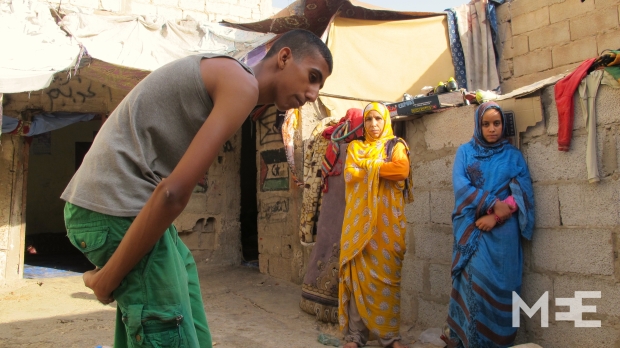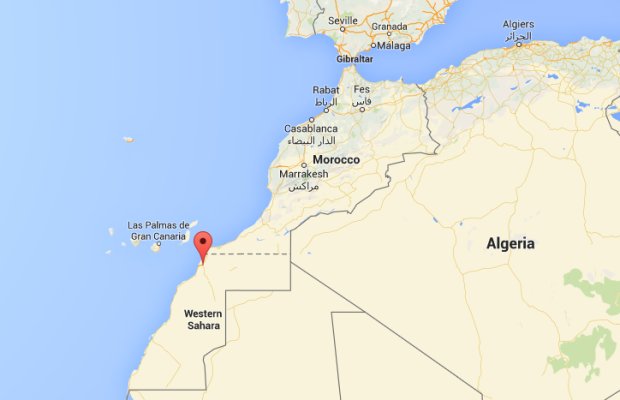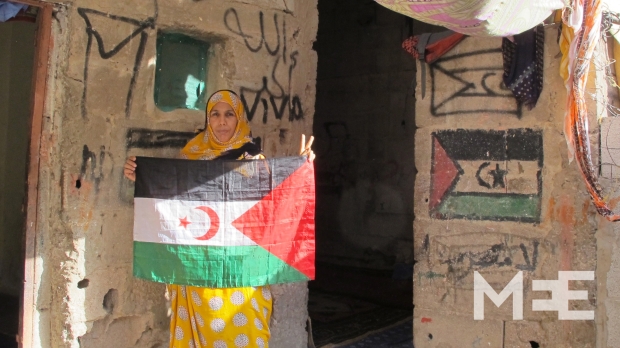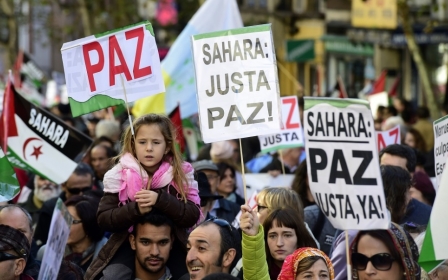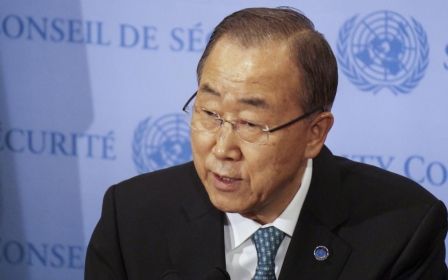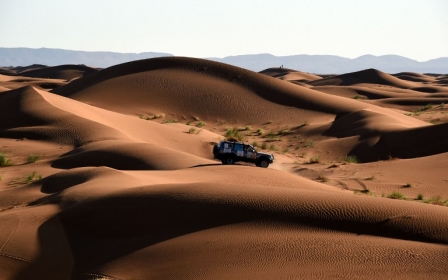Sahrawis' choice: Subjugation or exile in Western Sahara
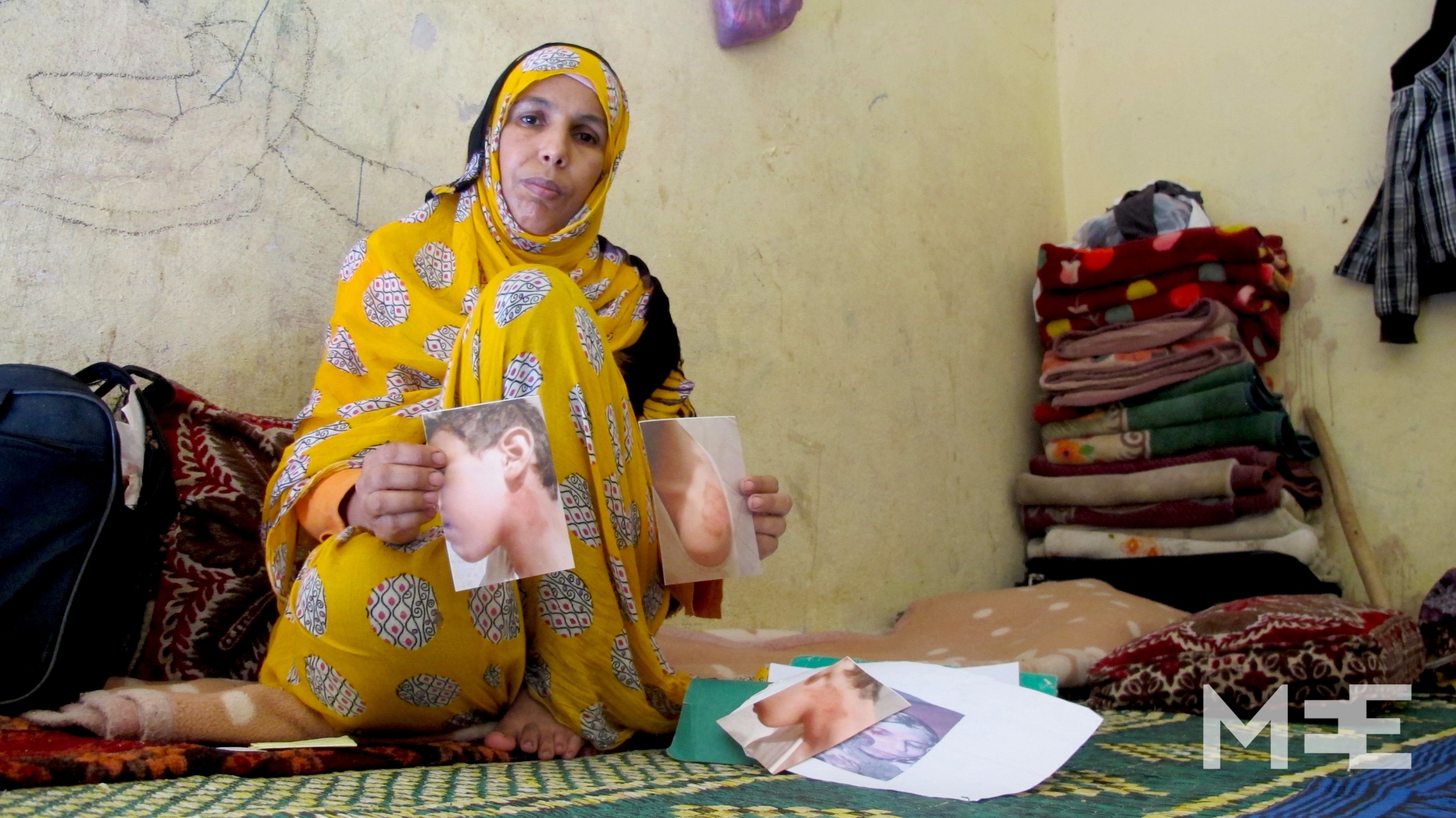
LAAYOUNE, Western Sahara – For Hatra Aram and her children, “home” is just a patch of rough floor and brick walls in what was once a block of apartments in downtown Laayoune, a city 1,100 km south of Rabat. The only refurbishing she could afford in recent years is the new awning that serves as a roof.
“I had to replace it after the attack of 2012. The police came at night and they beat me brutally before they burned the house,” recalled the 37-year-old Sahrawi.
Hatra Aram's house was raided at night in February 2012 by a squad of Moroccan policemen in plain clothes. Every part of her body was badly beaten, especially her head and face. She said that she is “under constant risk of detention” for allegedly hosting Sahrawi pro-independence meetings in her squat house.
The walls around her are still blackened from the smoke damage but, unlike the “roof,” repainting certainly is not a pressing need in a house that has no gas or electricity.
Hatra prepares tea on a coal fire. Meanwhile, the sound of the motorbikes waiting outside remind us of the constant police presence. Foreign journalists are prevented from setting foot in Western Sahara and often face deportation. During a week-long trip in Laayoune, this Middle East Eye reporter was constantly followed by Moroccan agents in plain clothes.
“My mother disappeared in 1977 and my brother was killed in the 'black' prison – the most feared detention centre in Laayoune. I come from a family of strong political convictions: it's both our heritage and our duty so we're all suffering the consequences,” explained Hatra. Hers is a familiar face in almost every protest against the Moroccan government and she is a fiercely pro-independence campaigner.
She acknowledged her family might face reprisals but she insisted on telling her own story.
“The father of my first four children disappeared after he jumped onto an illegal migrants' boat and I got divorced from my second husband only recently,” she added, just before producing pictures of Nasrallah, her 12-year-old son. She says he was grabbed off the street by police, detained and tortured.
This year will mark four decades since Spain pulled out from its last colony of Western Sahara. Since the ceasefire signed in 1991 between Morocco and the Polisario Front - the authority that the UN recognises as a legitimate representative of the Sahrawi people - Rabat has controlled almost the whole territory, including the entire Atlantic coast. The United Nations, however, still labels Western Sahara as a “territory under an unfinished process of decolonisation”.
Only a tiny desert strip on the other side of the wall built by Morocco remains under Sahrawi control. That's where the Sahrawi Arab Democratic Republic (SADR) was announced in 1976, a political entity today recognised by 82 countries.
By remaining in Laayoune, Hatra has skipped life in exile unlike hundreds of thousands of Sahrawis languishing in the Algerian desert.
However, her defiance in staying has come at a terrifying cost to her family. Hatra barely shows any emotion as she listens to her eldest son Abu Jihad describe the brutality of police detention in Western Sahara.
“They kept me handcuffed for three days while they beat me up during questioning,” recalled the 15-year-old, who looks visibly relieved to be back home. “It wasn't too bad, though,” he added, describing a previous arrest that left him with a broken hand and foot.
Abu Jihad was arrested, she says, as part of a recent police campaign targeting local teenagers allegedly involved in political activities. Abu Salam, a 17-year-old Sahrawi living on the same street, was recently told to go to the police station “within the next three days” through an official subpoena.
“I found it on the threshold five days ago,” Selma, Abu Salam's sister, told MEE, producing the document. “My father went to speak with the police and they told him they only wanted to ask my brother a few questions but we've told him not to go.”
The family's decision is understandable as cases of ill-treatment of juveniles are seemingly not isolated. Residents of the same district of Laayoune told MEE that several teenagers had been arrested in weeks. Moreover, a report on torture in Morocco by Amnesty International published last May recorded several cases of ill-treatment against Sahrawi children. The human rights watchdog labels the practice of torture in the country as "endemic" and underlines that Sahrawi political dissidents are among the main targets.
Along with the ever-present threat to her family's safety, Hatra also points to other unexpected consequences.
“They also want to get rid of him [Abu Jihad] at school because he has been arrested there twice.” Both Moroccan and Sahrawi children study together in Western Sahara's schools but Hatra said she's not sure if her son will be allowed to remain there or enrol elsewhere.
'Intifada'
Western analysts such as Noam Chomsky have argued that the so-called “Arab Spring” did not ignite in Tunisia as is commonly stated, but rather in Laayoune with the month-long protest encampment of Gdeim Izzik, in October 2010. The originally peaceful protest resulted in riots that spread to other cities when the camp in the outskirts of the city was forcefully dismantled on 8 November.
Unsurprisingly, Hatra and her children were among the thousands of Sahrawis who gathered at the camp. She recalls the protest as a “rare glimpse of democracy in this part of the world".
“For over a month we would sit down, men and women altogether, and vote in an open-air assembly on everyone and each decision to be taken,” remembers the activist, showing the same RASD flag she took with her to the camp. The banned banner is only visible inside the houses of a city were only Moroccan flags line up along the main Smara avenue, or above squares and buildings of all sorts.
Gdeim Izzik seemingly posed a serious challenge in a country where, according to Human Rights Watch, all public gatherings deemed hostile to Morocco’s contested rule were prohibited in 2014.
Tomas Barbulo, one of the most respected Western Sahara observers, told MEE: “There had been another significant uprising back in 2005, the so called 'Second Sahrawi Intifada', but it was mainly the youngest who rebelled. In Gdeim Izzik, however, it was the Sahrawi people as a whole, the youth and the elderly, men and women, married or single.”
The Spanish writer and author, who spent most of his childhood in Western Sahara while it still was under Spain's rule, said the conflict remains frozen because international law has not yet been enforced. “No referendum has been conducted so far, so the UN still considers the decolonisation process as unfinished,” said Barbulo.
France, Morocco' former colonial power and a veto country at the UN Security Council has managed to keep the UN Mission for the Referendum in Western Sahara (MINURSO) away from issues related to human rights in the annexed territory. Accordingly, Sahrawis are still waiting for a self-determination referendum originally scheduled for 1991 as part of the peace settlement between Morocco and the Polisario.
“This is nothing but massive open-air prison and we are all exhausted,” says Hatra from the doorstep of her makeshift house. Just a few metres away, three policemen in plain clothes keep a watchful eye over one of Laayoune's most notorious squat houses.
Stay informed with MEE's newsletters
Sign up to get the latest alerts, insights and analysis, starting with Turkey Unpacked
Middle East Eye delivers independent and unrivalled coverage and analysis of the Middle East, North Africa and beyond. To learn more about republishing this content and the associated fees, please fill out this form. More about MEE can be found here.


